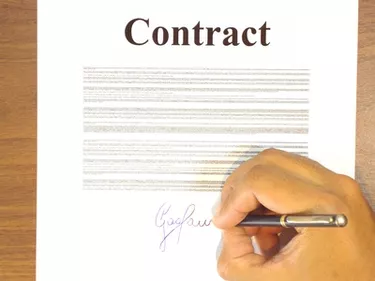
Contract for Deed Information
A contract for deed, sometimes called a land contract or agreement for deed, is a private mortgage between a buyer and seller on a piece of real estate. The buyer, instead of using a bank to finance the property, enters into an agreement that works the same as a home loan. The seller draws up a sales agreement, the buyer makes a down payment and makes monthly payments to the seller. When the final payment is made, the seller transfers the deed to the buyer.
Video of the Day
Interest Payments
Monthly payments on a contract for deed are calculated the same as conventional bank loans. Each monthly amount includes principal and interest. The interest, commonly called "juice" to real estate investors, represents the seller's profit. Usually, a seller will provide his buyer with a payment schedule that details how much interest, in dollar figures, the buyer pays each month. This information can be used when a buyer prepares his or her income taxes.
Video of the Day
Filing Taxes
When filing income taxes, a homeowner buying his house on contract will refer to the payment schedule provided to him by his seller to figure the amount of interest he paid on his contract for deed the previous year. Some, if not a significant portion, of that interest can be written off as an expense at tax time. This is usually permitted by the IRS, providing that contract for deed has been recorded and is secured by real property. The seller may wish to provide the buyer with an IRS Form 1098, although it is usually not required.